Top 10 “Most Opened” Blog Posts of 2019: # 7
By Easton Preston, MSW
Friends For Life (FFL) has opened a thrift shop to help fund our programs serving the elderly and people with disabilities. Instead of a normal resale shop with clothing and furniture, the Tool Shed refurbishes and sells used tools of all kinds. FFL got the idea of the Tool Shed Thrift Shop from one of our most helpful volunteers, Kevin Lane. Kevin and his wife recently moved to Hewitt and came to FFL’s January open house.
After hearing Inez Russell’s stories about FFL, Kevin approached Inez and her husband, Bill, about a Tool Thrift Shop in Fairport, New York that raises money for a charity that serves the elderly. That volunteer-staffed store collected tool donations and sold them for 50-90% off retail price. (Learn more about them here:https://www.youtube.com/watch?v=aXa9gHpBhlM&t=6s). It was such a great and unique idea that we decided to bring it to Waco. With a lot of help from Kevin and the Thrift Shop in New York, we moved forward on this idea this past March. Between March and August, we started advertising and collecting donations and volunteers. The soft opening was on August 14th and it has been going great ever since. In the past four weeks, we have customers that come in weekly to check out the new tools we have at great prices.

Over 100 people attended our grand opening celebration including Jimmy Don, who has done work for Joanna Gaines on Fixer Upper. Jimmy Don made and donated a metal sign of our logo that is displayed at the shop. Some of the festivities included raffle prizes including tickets to Baylor football, basketball, soccer, volleyball tickets, a Common Grounds gift card, a $50 gift card from Waco Custom Meats, a Magnolia gift bag and tour, a necklace from Waco Jewelers, gift cards to The Tool Shed, and a $50 Academy gift card. There were coffee and donuts donated by Dunkin Donuts and hot dogs donated by Super United IGA in Hewitt. Paul Catalina from ESPN came out for remote broadcasting and interviews. We even had an online silent auction of vintage, unique, and antique tools. Thank you to all who came out, donated, and helped us celebrate our official opening!
The Tool Shed depends on the community to help keep us running. Donations of old, new, used, or broken tools and hardware, volunteers to help, and shoppers are always needed. We need volunteers for a wide variety of things. Volunteers can help run the cash register, collect donations, paint, clean tools, fix tools, stock shelves, price tools, sort hardware and even help educate customers. Knowledge of tools is not needed. Volunteer hours are flexible. Come for two hours once a month or come every week, whatever fits in your schedule. Donating is easy! Stop by the Tool Shed to drop off a donation between 2 and 6 PM Wednesday through Friday or Saturday 10 to 3. Because of the help from Texas Junk Removal, we can also pick up your donated tools if that is easier for you. Contact Easton at the Tool Shed to arrange pick-ups or another drop off time.
The Tool Shed is located at 430 Lake Air Dr. It is currently open for customers Thursday and Friday, from 2:00-6:00 pm and Saturday from 10:00-3:00. We hope to see you all there!

Easton Preston is the Communications Coordinator & Tool Shed Manager at Friends for Life. In 2017, Easton moved to Waco from Dowagiac, Michigan, to attend Baylor’s Diane R. Garland School of Social Work with a community focus and in 2018 graduated with a Master of Social Work. In her spare time, she loves all types of crafting including quilting, making custom cups, home decor and more. Contact Easton at [email protected] or 254.772.8100 ext. 501
By Joe Riley
For more than nineteen years now (twenty in July!), KWBU has brought National Public Radio to greater Waco. Prior to 2000, McLennan County had been the largest metropolitan market in the country without National Public Radio service. Since then, Waco has grown, and KWBU has grown with it, enhancing its schedule with the highest quality news, talk, entertainment and music from around the world. Also, with the help of volunteers, the station provides more locally produced programming than ever (including Act Locally Waco!). And KWBU now has the largest audience in its history. Every week, some 15,000 faithful listeners tune in to learn about our world and our community. That’s up 50% from just five years ago.

Some of the growth in audience is due to the relocation of the station’s transmitter in 2014, providing a clearer, more consistent signal to previously unreached parts of the county. Another factor has to do with politics and the news. During the last presidential election season, many new listeners came to KWBU to keep track of the rapidly changing political and cultural landscape. Trustworthy journalism is essential to a healthy democracy.
KWBU brings this service to Waco – every hour of the day, every day of the year – with a staff of six and a cash budget of about $750,000. Some might think the station is taxpayer funded; in fact, KWBU receives only about 15% of its annual budget as a Community Service Grant from the Corporation for Public Broadcasting. All the rest of the funding is local. About half comes from Baylor University (the station is licensed to the Brazos Valley Public Broadcasting Foundation, a subsidiary of Baylor); another portion comes as program support from local businesses; the remainder is donated by individuals – financial support from listeners is the most important source of revenue for Waco Public Radio.
But here’s the odd thing: while listenership is higher than it’s ever been, the number of donors has actually declined. Some have moved away, some have passed away, others have seen changes in their financial situations. Now fewer than five out of one hundred listeners support the KWBU financially. And, as with all organizations, expenses continue to increase every year.
In calculating what this means for the station, here are a couple of important facts:
- First, the money KWBU receives from the CPB and from Baylor provides a consistent foundation of support, with the expectation that those who use the service will donate money on an annual basis to assure the on-going health and growth of the station. There is no expectation that funds from CPB and Baylor will increase.
- Second, station expenses go up, on average, about 3½% per year.
To keep up with increases in expenses, funding from individuals and local organizations must grow at an even higher rate – about 7½% per year. This will require a broader base of support – more individuals joining in with the 5% who already give.
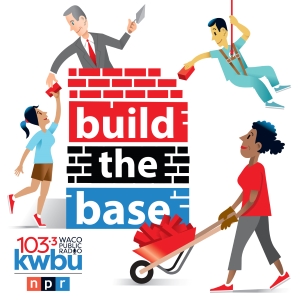
Build the Base is a new initiative to strengthen KWBU/Waco Public Radio’s base of support by adding at least six new donors per month. That doesn’t sound like a lot, but over time it will reverse the trend of declining membership. And it’s catching on – since the beginning of the fiscal year in June, more than thirty first time donors have signed up. Your support will help maintain the momentum toward a truly sustainable base of support.
So what can you do? Here are a few ideas:
- Pledge your support! Choose an amount that fits your budget and call (254) 710-1033, or pledge online here: https://www.kwbu.org/become-member#stream/0 .
- The average first-time pledge is about $120, but there is no minimum – the amount is up to you.
- If you’re already a member, consider increasing your pledge, or making an additional gift.
- Are you a Baylor employee? Sign up for payroll deduction: https://www.kwbu.org/payroll-deduction-form#stream/0 .
- Donate your old car: http://kwbu.careasy.org/home .
- If you’re a businessperson, join our Program Sponsorship Team: https://www.kwbu.org/become-kwbu-program-sponsor#stream/0 .
- Talk about the station with your friends, and encourage them to become members!
KWBU is a vital part of the Waco community, providing compelling, trustworthy journalism and intelligent cultural programming and entertainment. Your support really does make a difference. Thank you!

Joe Riley has been President and CEO of the Brazos Valley Public Broadcasting Foundation/KWBU since 2009. Prior to coming to Waco, he worked many, many years in broadcasting in Maine, Tennessee, Alaska, and the Carolinas. He holds a BA (in English!) from Furman University.
The Act Locally Waco blog publishes posts with a connection to these aspirations for Waco. If you are interested in writing for the Act Locally Waco Blog, please email [email protected] for more information.
By Hermann Pereira
The start of a new school year is an exciting time for students and educators alike. As educators we are focused on making this school year better than the last because we know our students are depending on us. The HOT P-20 council is equally focused and excited about making the 2019-2020 school year better than ever. There is a contagious feeling of collaboration and growth in our city and we are seeing this in our P-20 council as well.
The HOT P-20 works to bridge the gap and create partnerships between K-12, institutions of higher education (IHE), the business community and the community of Waco. The council is a collective impact think tank that brings together representatives from the independent school districts (ISD), institutions of higher education (IHE), Region 12 Education Service Center, industry and government across six counties: Bosque, Hill, Falls, Limestone, Freestone and McLennan to work towards this goal. Among the higher education representatives are McLennan Community College, Texas State Technical College, and Hill County with representation from both Tarleton State University, Texas Tech through MCC’s University Center.
The P-20 goals are to :
- Promote college and career readiness for all students in the network
- Build bridges and partnerships among school districts, higher education, government and industry
- Promote promising and best practices and models
- Provide educational and support resources to member institutions
We have seen lots of growth in our group and that is due to everyone’s collaborative spirit they bring to each and every meeting. I had a mentor once say that “there is power in showing up”. I am proud of the work we have accomplished and that is due to the community that “shows up” and rolls their sleeves up for the success of all students in our area.
You are invited to join our meetings that take place at the Greater Waco Chamber of Commerce.
October 1st 8:00 am
December 3rd 8:00 am
February 4th 8:00 am
April 7th 8:00 am
If you would like to be a part of our newsletter please email [email protected]

Hermann Pereira is the current chair of the HOT P 20 council and the Principal of Connally Career Tech P-Tech Early College High School. He is a Houstonian who roots for all Houston sports teams but has called Waco home for over a decade. He is married and has two children.
By Inez Russell
This month Friends for Life is celebrating 30 years of serving the elderly and people with disabilities. We are having an Open House on September 24th from 5 to 7 and we are saying thank you to other agencies, organizations and individuals who have helped us take care of people in need.
In September of 1989, Friends for Life began in a tiny one-room office, with one unpaid employee, and a budget of nothing. Now, by the grace of God, Friends for Life has grown and now resides in a wonderful 28,000 square foot facility at 5000 Lakewood Drive with offices in six other cities, eighty-five paid employees and a budget this year of three million dollars.
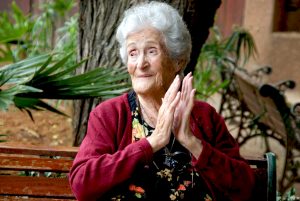
In the beginning, Friends for Life visited elderly people who were alone in hospitals and nursing homes. Those visiting programs have grown into Quality of Life Programs that include adopt a grandparent, telephone reassurance, Gifts for Grannies & Grandpas, too, and Friends for Thanksgiving. We look for ways to let people know we care and that they have someone they can call if they need help. When we were asked to visit people in their own homes, we learned that many needed more than a visit.
We found one lady living in the dark. She moved from room to room as the light bulbs burned out in her house and when the last one burned out, she was living in the dark. We started a light bulb changing program. Another agency asked us to help an elderly man whose porch was so rickety they thought volunteers might fall through if they brought him meals. We started a minor household repair program. An elderly woman became wheelchair bound and was stuck in her house for five years because she did not have a ramp. We started a ramp-building program. These programs grew into Independent Living Programs where volunteers are recruited and trained to help the elderly and people with disabilities live in their own homes as long as possible.
Each time we discovered a need, we tried to find another agency that provided that service so we could connect them to the person who needed their help. If we could not find another agency to provide the service, we figured out how to do it ourselves.
When he was found unconscious, an elderly man needed someone to sign for him to have medical care and Friends for Life was appointed to serve as his legal guardian.
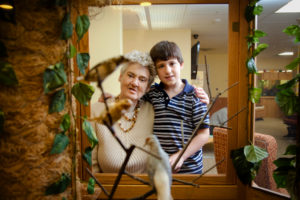
Thirty years later, we are serving about 500 clients in 50 counties in Texas. Friends for Life has the third largest guardianship program in the state behind Harris County and the State of Texas. This program provides protection from abuse, neglect and exploitation, and insures these vulnerable people have food, clothing, medical care….someone to advocate for them and someone to care. When possible, we work with our guardianship clients to help them build capacity and return to court to request that the judge restore his or her rights.
In 1995, Friends for Life began a Money Management Program when asked to take care of an elderly widow who was about to be evicted because she had not paid her rent in a year. Most of the clients served through this program have been exploited. We make sure their bills are paid and that their money goes to their care.
Friends for Life took over the adult day care program in 2000 that was scheduled to close. Open 7:30am to 6pm, Monday through Friday, the Friends for Life Adult Day Care Center provides nursing care, activities, meals, transportation and more. Taking 4 field trips a week and celebrating holidays most people do not know exist (National Jelly Bean Day, Macaroni Day, National Cheesecake Day – they are big on food holidays). The clients are having a lot of fun….so much fun, in fact, that the facility is almost always at full capacity which is 120 people.
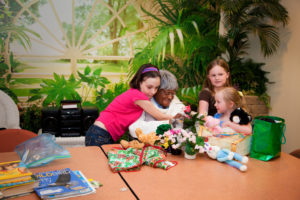
Two years ago, Friends for Life started a new program training adults with intellectual or developmental disabilities to learn skills that will help them be more independent. Working one on one with them everyday for 2 hours made all the difference in the world. The overarching goal of the program is to help people move out of the nursing home and four of our clients have moved out of their nursing homes and back into the community. We are working with two more to do the same. And, all seem to have benefited so much from this individual attention.
I interviewed a Life Skills Training professional once who was not sure she could figure out how to help these clients. She prayed about it and the answer came to her. ‘Start with love’. In everything we do at Friends for Life, we try to start with love.
To learn more about Friends for Life, to volunteer or to make a donation to support this work, please visit our website at www.friendsforlife.org, call 254-772-7600 or come by our office at 5000 Lakewood Drive in Waco and we will give you a tour.
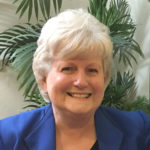
Inez Russell is the founder of Friends for Life and has served as its Executive Director for the last 30 years. She is certified in guardianship on a state and national level and is President of the Board of Directors of the National Volunteer Caregiving Network. Inez has lived in the Waco area most of her life. She is married and has four children and eleven grandchildren. [email protected], 254-772-8100 ext. 106
Applications for Campustown Connect Fall 2019 are open until September 20. Click here to apply!
By Lexy Bishop, Research & Project Manager at the Greater Waco Chamber
The beginning of a new school year can bring all sorts of emotions for students. College juniors and seniors have some especially deep and looming questions: What am I doing after college? Where do I want to put down roots? What jobs do I apply to? We at the Greater Waco Chamber of Commerce understand those concerns and believe that the Waco community just might be the answer those concerns.
CampusTown Connect was birthed out of the CampusTown initiative, whose mission is to connect Waco area students in higher education to the opportunities available to them in the community. Through the six-week program, CampusTown Connect offers students the ability to explore the ins and outs of the Waco community and be introduced to the ways that they can take root in the city after graduation.
“CampusTown helped me understand the people and places that make up Waco’s identity and its culture,” Baylor senior Isaiah Scott said. “Understanding how the Waco community operates interconnectedly can give you a great appreciation for the city, especially as a college student.”
From the history of Waco to its budding entrepreneurial scene to learning the city government structure, students will dive into the community of Waco beyond their campus. The goal at the end is for students feel connected to their peers in other area colleges, connected to the community, and connected to the right people and job opportunities as they begin their career. “CampusTown Connect gave me access to really good connections in Waco,” second-year TSTC student Ashley Fullerton recounts. “It showed me different areas to give back to the community and confidence to get more involved on my own campus.”
Students who are interested in staying in Waco or even just exploring the option are encouraged to apply! The class is a two-hour a week commitment for six weeks beginning on October 1. For more information or to download an application, please visit wacochamber.com/Campustown-Connect.

Lexy Bishop is the Project and Research Manager for the Economic Development team at the Greater Waco Chamber. She considers herself a Waco Enthusiast and loves supporting local entrepreneurs. You can find her sipping on a Pinewood coffee or working on her new home in Dean Highlands.
The Act Locally Waco blog publishes posts with a connection to these aspirations for Waco. If you are interested in writing for the Act Locally Waco Blog, please email [email protected] for more information.
By Kennedy Sam
Each year during Hispanic Heritage Month (Sept. 15 – Oct. 15), we as a nation recognize and celebrate the cultural contributions of the almost 59 million Hispanic Americans in the United States. This is a special time for many Latin American communities as they celebrate their independence. Costa Rica, El Salvador, Guatemala, Honduras and Nicaragua, Mexico, Chile and Belize all gained their independence during this time frame. This is the perfect opportunity to join in on the celebration honoring Hispanic heritage, culture and influence!
One of our latest episodes of Conversations with Creative Waco featured local leaders Alfred Solano, President/CEO of the Cen-Tex Hispanic Chamber of Commerce, and Arts Organizer Monica Shannon talking about the importance of Hispanic Culture in Waco. ( Catch up on the episode. ) Inspired by those conversations, and in honor of the month-long celebration, we’ve put together a list of six ways to celebrate Hispanic Heritage in our community:
Six Ways to Celebrate Hispanic Culture
1. Mexican Independence Day Parade
Sunday, Sept. 22 from 1-2 p.m. on Austin Avenue
The Waco Hispanic Museum is celebrating Hispanic culture with its first parade. The parade will run on Austin Ave. from 9th to 3rd street. If you would like to get involved and participate, please contact Louis Garcia at 254-548-9730.
Sunday, Sept. 22 at 4 p.m. at the Extraco Events Center
Fiestas Patrias is a FREE event celebrating Mexico’s Independence Day. This family-friendly event features live music, food and drinks, moon-walks, and more fun for the whole family!
3. Jacob de Cordova: “Father of Waco” Fall Lecture with Vann de Cordova
Tuesday, Sept. 24 from 6:30-8:30 p.m. at the Lee Lockwood Library and Museum
Learn more about Waco’s diverse history from David Vann de Cordova, the third great-grandson of Waco’s founder Jacob de Cordova. Through the retelling of his life, David Vann de Cordova recalls Jacob’s legacy and his amazing exploration in Texas.
Discover how Jacob’s unique background — a Jewish, Jamaican-born Spaniard — has continued to impact our city throughout generations. This FREE lecture is hosted by The Historic Waco Foundation, in collaboration with the Cen-Tex Hispanic Chamber of Commerce, McLennan County Historical Commission, and Texas Fine Artists.
Also, you can find a timeline of Jacob de Cordova’s “Waco Adventure” on display on Waco Transit’s fleet of buses during this month-long celebration!
4. Hispanic Heritage and Arts Celebration
Friday, Sept. 27 from 6-9 p.m. at the Art Forum of Waco

Celebrate Hispanic heritage and culture through art! This free event at the Art Forum of Waco will feature original pieces by over 33 local artists highlighting or inspired by Hispanic heritage. Enjoy live music, art, and an award presentation ceremony sponsored by Allen Samuel’s DCJ! Hosted by the Cen-Tex Hispanic Chamber of Commerce and Texas Fine Artists, join the festivities at the Second Annual Hispanic Heritage Art Show and Celebration.
The Art Forum of Waco also serves as a Hispanic arts cultural hub. The gallery often features exhibits honoring influential Hispanic artists like Frida Kahlo and holidays like Día de los Muertos. Stay up to date with the gallery’s events here!
Sunday, Oct. 6 from 12-8:30 p.m. at the Sacred Heart Church
Sacred Heart Church is hosting their Annual Dia del Charro Festival on the church patio grounds.
This celebration is one of the biggest Charro Day Festival in Central Texas. Come out and enjoy food, games, live music, Charreria and Horse Show, and Ballet Folklorico. This is a family friendly event honoring cultures from various Mexican Regions.
6. Support Local Artists and Businesses
Last but not least, one of the best ways to celebrate is by supporting local artists and businesses. Many of our entrepreneurs were inspired by their heritage and culture when they created their products. When you support their craft and buy local you are helping to bring our community together and boosting our local economy. This is an awesome way to celebrate Hispanic heritage and culture year-round!

Kennedy Sam is the Director of Marketing and Communications for Creative Waco, McLennan County’s arts agency. As a longtime Waco resident, upon receiving her degree from Louisiana State University was excited to return to her hometown to begin her career serving the community she loves. In her spare time, she enjoys rediscovering all that Waco has to offer and exploring the many walking trails with her pup Bleu.
The Act Locally Waco blog publishes posts with a connection to these aspirations for Waco. If you are interested in writing for the Act Locally Waco Blog, please email [email protected] for more information.
By Shaun Limbers
Baylor University, nestled on the banks of the Brazos River in Waco, is a private Christian university and a nationally ranked research institution. Chartered in 1845 by the Republic of Texas, Baylor is the oldest continually operating university in Texas, and in fact, is older than the State of Texas itself. In 1977, Baylor became one of the first universities in the nation to create a Center for Entrepreneurship. Within the highly ranked Hankamer School of Business, the Baugh Center for Entrepreneurship & Free Enterprise (the “Baugh Center”) is the focal point for entrepreneurial development at Baylor. At its core, the purpose of the Baugh Center is to develop entrepreneurs outside the walls of the Baylor classroom and help catalyze and grow business ventures.
Baylor’s mission is to educate men and women for worldwide leadership and service by integrating academic excellence and Christian commitment within a caring community. Since its founding over 174 years ago, Baylor has continually maintained a tradition of extending its mission outside the halls of academia into the local community. As an active participant in the Waco small business community, Baylor and the Baugh Center observed a need for business and entrepreneurship training, particularly among small businesses that exhibit potential but that may lack fundamental business knowledge to achieve that potential.
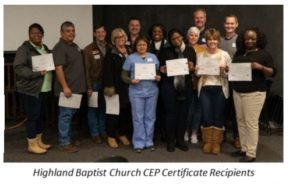
The Baylor Community Entrepreneurship Program (the “Baylor C.E.P.”) is a faith-based community business and entrepreneurship training program created for small businesses, hosted by local churches or community centers, and facilitated by local successful entrepreneurs and executives. Each Baylor C.E.P. course is comprised of a total of 8 sessions held weekly at local community churches or community centers, with each session running for 2 hours. The Baugh Center provides the Baylor C.E.P. with best-in-class business and entrepreneurship content developed by some of the brightest minds in business. Unique to the Baylor C.E.P., best-in-class business and entrepreneurship content is delivered in an environment that is openly faith-based, welcoming small business participants from all faith backgrounds to learn in a caring, faith-based environment, with an emphasis placed on business excellence achieved through ethical business morals and execution. While core program content makes the Baylor C.E.P. unique, so too does its format insomuch as it relies less on traditional classroom lecturing and instead focuses on business fundamentals delivered through engaging core content provided in conjunction with interactive classroom exercises, peer problem solving discussions, real world case studies with facilitator explanations, and Baylor student collaborations – all facilitated by successful entrepreneurs and executives. This unique format is designed to achieve maximum impact, particularly with small businesses who thrive in this type of learning environment.
In addition to core business fundamentals and training, the Baylor C.E.P. is also designed to architect a network of additional business and entrepreneurship resources available to small business participants. This network of additional business and entrepreneurship resources include, among other items, QuickBooks accounting training and access provided in partnership with Intuit (a $1,000 value), opportunities to be matched with mentors and business leaders in the community, funding and loan assistance for small businesses, as well as networking opportunities.
Two Baylor C.E.P. courses were successfully conducted in Spring 2019 with large community churches based in Waco. A Baylor C.E.P. course will be offered at Highland Baptist Church in Waco beginning on September 23, 2019 and will be comprised of 8 sessions, with each session held on Monday nights from 7:00pm to 9:00pm at the Highland Baptist Church campus. While the Baylor C.E.P. provides thousands of dollars in value to small business participants, the cost is only $40.
The goal of the Baylor C.E.P. is to empower small business participants with the opportunity to achieve economic transformation, rooted in faith-based business and entrepreneurship. That economic transformation in turn provides small business participants with the opportunity to positively impact and transform the lives of their own families, friends, churches, and communities – representing a catalyst for the Waco community at large. For participants of the Baylor C.E.P., it’s an opportunity to empower themselves with business fundamentals and resources designed to help them achieve their goals. “Taking the CEP class was one of the best decisions I have made as a small business owner,” says Tonja Carpenter, owner and founder of a local small business specializing in caring for expecting and new mothers.
The next Baylor C.E.P. course will begin on September 23, 2019, and will be hosted by Highland Baptist Church. Enrollment is currently underway and is open to small business owners and their employees. Scholarships are available for those who are unable to meet the $40 enrollment fee. For more information and to enroll, please email [email protected] or send “TEXT” to Arnold Reyes at (214) 476-5456.

Shaun Limbers currently serves as Program Manager for the Baylor Community Entrepreneurship Program, having recently relocated to Waco with his wife and children from Scottsdale, Arizona. Shaun’s career has spanned numerous facets of private venture finance and investment, with an emphasis in private equity. Shaun can be reached at [email protected].
The Act Locally Waco blog publishes posts with a connection to these aspirations for Waco. If you are interested in writing for the Act Locally Waco Blog, please email [email protected] for more information.
By Lindsey Breunig
Whatever life stage you are in, let’s join the new school year and celebrate the start by making some healthy green habits. Unless your school allegiances bleed green or are celebrating a green-themed holiday, incorporating regular dark leafy greens into your diet can be tricky. When I encourage someone to eat more greens some comebacks I hear are: “they are gross” “I only like the white lettuce” “they are bitter or taste like grass” or “that is rabbits’ food” – Well today our goal is to squash these comebacks!
Some common dark leafy greens are kale, chard, collard greens, arugula, spinach, and bok choy. A half-cup serving is 10 to 25 calories and jam-packed with bursting health benefits. Dark leafy green vegetables contain many nutrients, such as vitamin A, vitamin C, antioxidants, fiber, folate, vitamin K, magnesium, calcium, iron and potassium. The USDA’s MyPlate recommends adults and children over 9 years old to eat 1 ½ to 2 cups of dark green vegetables per week. Generally, 1 cup of raw or cooked vegetables or vegetable juice, or 2 cups of raw leafy greens can be considered as 1 cup. The nutrients from dark leafy greens support a variety of functions in the body. For example, the nutrients support good vision, increase immune function, regulate blood pressure, and act as antioxidants to potentially help prevent certain cancers.
(Source: https://www.choosemyplate.gov/vegetables)
Dark leafy greens often have an intense flavor which can be off-putting. Unfortunately, simply knowing these veggies are nutritional superstars does not always make them taste any better. Below we will discuss ways to make them more appetizing! For storing, washing, and keeping leafy greens fresh click here.
- Tender greens such as spinach or baby kale are great for salads. If incorporating more leafy greens into your diet is a new change, try making the salad with a familiar lettuce and half with a dark green one. Use a citrus-based dressing to help balance the strong flavor of the greens.
- Remove tough stems. For new “green eaters” the stems are often more bitter and tough to eat. Additionally, this will reduce cooking time and help avoid over-cooking the greens.
- When cooking with kale: Tougher curly kale is best for soups or stews, while tender Lacinato (flatter leaves) and baby kale are best in salad or as chips.
- When braising at a low temperature for an extended period, a pinch of sugar can help overcome the bitterness of collard and mustard greens.
- Sauté vs. boil: sautéing greens will help lock in nutrients better than boiling. Sauté greens with olive oil, onion and garlic to add flavor. For a crunch and heart healthy fat add chopped nuts like walnuts or pecans.
Green Recipes:

A class favorite: Chicken Vegetable Soup with Kale
We made this during the summer & kids love the crunch: Bok Choy Noodle Crisp
Add kale or spinach to a fruit smoothie for a quick and delicious breakfast or snack: Simple Green Smoothie

Lindsey Breunig is a graduate of Baylor University and currently works as the Better Living for Texans Educator for the Texas A&M AgriLife Extension Service. She is originally from Grapevine, TX and now calls Waco home. Here in Waco she loves to venture out to Cameron Park, visit the local Farmers Market, and try out the awesome eateries in Waco. If you see her and hear a loud bark, that’s her pup Lucy just saying hello.
USDA is an equal opportunity provider and employer. This material was funded by USDA’s Supplemental Nutrition Assistance Program — SNAP. To learn more about the Supplemental Nutrition Assistance Program (SNAP) or to apply for benefits, visit www.yourtexasbenefits.com
The Act Locally Waco blog publishes posts with a connection to these aspirations for Waco. If you are interested in writing for the Act Locally Waco Blog, please email [email protected] for more information.
Top 10 “Most Opened” Blog Posts of 2019: # 2
By Phillip Ericksen
Eddy Garcia is bringing some sweets back to the neighborhood.
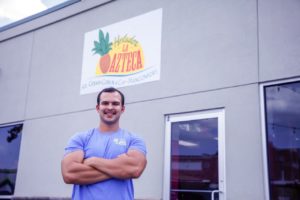
The 23-year-old McLennan Community College graduate is opening Helados La Azteca No. 2 – a Mexican dessert shop – at the intersection of Colcord Avenue and North 15th Street.
The shop opened Saturday in the growing North Waco area primed to celebrate local business and the Hispanic culture of the neighborhood.
Garcia was born in Los Angeles and moved to Waco with his family when he was 8 years old. He earned his associate of arts degree from MCC this Spring, on top of a certificate of completion from the MCC Fire Academy in the Fall of 2017.
“A lot of doors open up with school,” he said. “You’ve got to find the right opportunity and take it, and that’s what I did. As soon as I got my associate’s degree, this is what I’ve been doing since.”
Garcia thanked Bradley Turner, an associate professor of environmental science, who especially motivated him.
“I was taking his class while I was opening this up,” Garcia said. “He motivated me so much.”
Garcia’s family operates the original location of Helados La Azteca at 3302 Franklin Ave. This new shop will sell Mexican ice cream, paletas, fruit and other Mexican desserts. It will also carry Blue Bell ice cream, a Texas favorite.
World Cup Café and Fair Trade Market, Jubilee Food Market and D’s Mediterranean Grill surround the area that also includes Baked Bliss Baking Company, West Avenue Elementary School, Grassroots Community Development and Family Health Center.
Mission Waco, a local nonprofit, owns Garcia’s space known as The Colcord Center. Garcia credited the strength of the neighborhood and the support of all involved in the project.
He also plans to partner with the Cen-Tex Hispanic Chamber of Commerce and participate in events with other local businesses.
The location of Helados La Azteca No. 2 is just a short drive from MCC, where thousands of students are on their pathways to either a new profession or a promotion in their current field.
Potential students may explore courses and register at mclennan.edu.

Phillip Ericksen is the marketing and communications specialist at McLennan Community College. For about four years, he was a journalist at the Waco Tribune-Herald covering higher education and local government. He enjoys following the news, reading books and drinking coffee. As a San Antonio native, he is an avid fan of Mexican food and the Spurs basketball team. He holds a bachelor’s degree in journalism from Baylor University. He can be reached at [email protected].
The Act Locally Waco blog publishes posts with a connection to these aspirations for Waco. If you are interested in writing for the Act Locally Waco Blog, please email [email protected] for more information.
By Katie Galgano
“The right of citizens of the United States to vote shall not be denied or abridged by the United States or by any State on account of sex. Congress shall have the power to enforce this article by appropriate legislation.”
The Nineteenth Amendment is short yet strong. It encompasses over 60 years of struggles, enveloping many setbacks and hard-fought victories, by suffragettes, uniting both famous leaders, such as Susan B. Anthony and Elizabeth Cady Stanton, and every day women, such as Kate Heffelfinger and Frances Harper. This year, 100 years after the passage and 99 years after the ratification of the Nineteenth Amendment into the U.S. Constitution, we remember and commemorate the efforts of these courageous women who fought valiantly in the face of mockery, ignoration, and even violence.
The fight for women’s suffrage began in 1848 at the Seneca Falls Convention, the first women’s rights convention. At this Convention, Elizabeth Cady Stanton and the delegates created the Declaration of Sentiments, a document modeled after the Declaration of Independence, declaring that all men and women are created equal. Though the press mocked this declaration, it did not deter the efforts of the suffragettes. Despite the loss of momentum during the Civil War, the movement persisted. In 1869, Susan B. Anthony and Elizabeth Cady Stanton founded the National Woman Suffrage Association, focused on amending the federal constitution to allow women to vote, and Lucy Stone and Henry Blackwell formed the American Woman Suffrage Association, focused on amending state constitutions. These two organizations merged in 1890, becoming the National American Woman Suffrage Association. Within six years, four territories and states adopted amendments to their state constitutions allowing women to vote. Between 1910 and 1918, under the leadership of Carrie Chapman Catt, the National American Woman Suffrage Association succeeded in gaining voting rights for women in seventeen additional territories and states.
During this same time, Alice Paul founded the Congressional Union for Woman Suffrage, which later became the National Woman’s Party. As chairwoman, Alice Paul planned demonstrations and led her members in picketing the White House, an act uncommon during this time but virtually unheard of for women. These demonstrations continued for five months until finally the public and the Administration reached a breaking point. Many women were arrested, charged, convicted, and jailed for obstructing traffic.
The struggle continued. President Wilson, first an opponent of women’s suffrage, became a supporter and lobbied Congress to pass the amendment in 1918. The amendment was first drafted and introduced to Congress in 1878 by Susan B. Anthony and Elizabeth Cady Stanton. Every year between 1878 and 1919, this amendment was introduced in the Senate, but every year it failed, until finally on June 4th, 1919, the Senate passed the amendment and sent it to the states to be ratified. The amendment was ratified narrowly, with one vote breaking the tie in Tennessee to reach the required two-thirds of states on August 18th, 1920. On August 26th, 1920, U.S. Secretary of State Bainbridge Colby certified the Nineteenth Amendment, officially amending the U.S. Constitution to allow women the right to vote. On November 2nd of 1920, over 8 million women voted in elections for the first time. Despite this hard-fought victory, it took over sixty years for the remaining states to ratify the Nineteenth Amendment, with the final ratification occurring on March 22nd, 1984, in Mississippi.
In a Joint Resolution of Congress in 1971, led by Congresswoman Bella Abzug, Women’s Equality Day was established on August 26th to commemorate the ratification of the Nineteenth Amendment. Since then, however, Women’s Equality Day has expanded to celebrate the work of organizations across the country working to provide women with equal opportunities. So, today as we look back and remember those who led the fight for women’s right to vote, let us also look forward. Just as we cannot forget these courageous women in history, we cannot forget the struggles of women today. Although more women have voted in every presidential election since 1980, women are far less represented in government than men. Despite 2018 being dubbed “The Year of the Woman”, only 20 percent of Congress is comprised of women. In terms of the percent of women in national parliaments, the United States is ranked 75th. Statewide, women constitute 25 percent of state legislators and 24 percent of executive offices, with female governors making up a mere 12 percent. So on this day of Women’s Equality, let us celebrate the achievements of the suffragettes, while also continuing their legacy and carrying on their fight for equality.

Katie Galgano is a recent Baylor graduate, receiving her B.A. in International Studies. She currently works for the Twenty First Century Group and is pursuing a career in foreign policy. She previously worked with the U.S. Department of State in the Secretary’s Office of Global Women’s Issues where she helped progress U.S. policies and the advancement of women.

